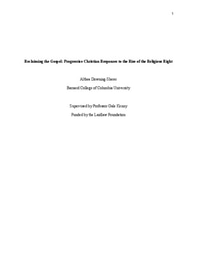Summer 1 Research: Reflection 2
With the sixth week of my first Laidlaw research summer drawing to a close, the data collection portion of my research has also wrapped up. I conducted my final interviews on Friday and am almost finished with the coding and analysis process. Now that I have thematically sorted my subjects’ responses, common themes are beginning to emerge in my analysis, which I am excited to explore in more depth in my final paper. One of the biggest lessons I think I’m learning from this research experience is how to narrow the scope of my research due to both time and practicality restraints. For a larger, more long-term project, I would love to spend more time in these religious communities doing participant observation and conducting even more interviews. But because I am simply conducting semi-structured interviews with clergy and don’t have the time or means of conducting an in-depth ethnography, I’ve decided to center my paper around the ways in which clergy narrativize their experience as faith leaders in a politically complex moment for Christianity. Here are the most common narratives I see emerge from my interviews:
- Modeling an alternative in the face of Christianity’s perception problem: when I ask participants about what they think the public perception of Christianity is, I get answers ranging from “terrible” to that Christianity is all “bigoted idiots.” Many pastors even express pressure to distance themselves from the Christian label due to its association with conservative Evangelicals. However, many participants also expressed their belief that their role as clergy was to model and promote an alternative to what they view as a negative perception of Christianity, an alternative that is generally more politically progressive, that prioritizes action over abstract spirituality, and that some even implied was a more orthodox form of Christianity (which goes to my next theme…)
- Theological arguments against white Christian nationalism: many clergy participants talked in a way that portrayed progressive Christianity as an authority on Christian orthodoxy. Some even accused Christian nationalism of being a “heresy” or a “perversion” of their faith. They often also cite evidence from scripture.
- Advocating for a modern Social Gospel: almost every participant I talked with described the phenomenon of their faith provoking action, or their faith inspiring them to move out into the world and make tangible change. My research centers mainline Protestants, who were at the center of the Social Gospel movement in the early 20th-century. This was a movement that used Christian ethics to tackle real-world social problems, similar to the inseparable link between faith and activism that exists for most of my interviewees. However, I call this a “modern” Social Gospel movement because many of my participants expressed a sense that the church’s importance in American society had decreased over the years. The first Social Gospel movement flourished when churches were a part of everyday life for Americans, so I’m excited to explore in my final paper how the shifting landscape of American Christianity has impacted mainline Protestant activism and also how Social Gospel sentiments make the clergy I interviewed inherently opposed to Christian nationalism.
Doing this research and learning more about the field of religious studies has also forced me to reflect on how we talk about the “authenticity” of religion. There are always battles over who gets to be the authority on Christian orthodoxy and about who is a “true” Christian. This goes for any religion. But the truth is, Christianity has been appropriated for political reasons since its inception, both by persecuted early Christians and later by those in power when it was named the official religion of the Roman Empire. We see this tension again and again throughout history, with the Black liberation theology of enslaved people contrasting the horrible ways Christianity actually enabled slavery. During the Civil Rights Movement, the Christianity of Martin Luther King Jr. or Howard Thurman prioritized the rights of the oppressed while many white Christians used the Bible to argue against interracial marriage. One issue I’ve had to reckon with throughout this research process is that despite my biases and personal interpretations of scripture, Christianity has a diverse and messy history and as a researcher it is not my place to define what an orthodox form of Christianity is.
Overall, these past six weeks have been an amazing experience. Speaking to clergy from my home state whose perspectives and activism often go overlooked has been a really inspiring experience and I feel that it has immensely improved my interview skills. I want to thank the Barnard Laidlaw Committee and my incredible advisor Professor Gale Kenny for assisting me with everything from learning to code interviews to putting me in contact with new subjects. Over the next few weeks I look forward to synthesizing my research in my final paper!

Please sign in
If you are a registered user on Laidlaw Scholars Network, please sign in